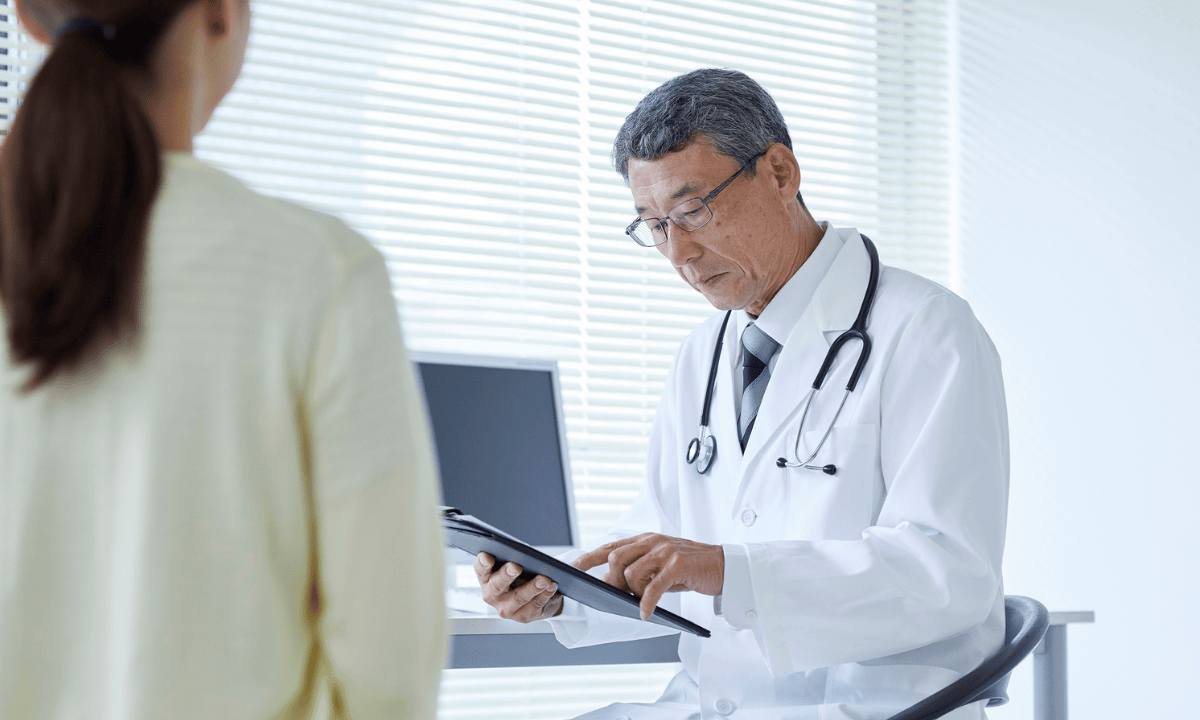"It's just a period," but what if it's not?
You've been told your whole life that periods are supposed to hurt. Maybe your mother had painful periods. Maybe your friends complain about cramps too. So you push through, take painkillers, and plan your life around those few days each month.
But what if the pain that's controlling your schedule, affecting your work, and keeping you up at night isn't actually "normal"?
If your menstrual cramps are severe enough to disrupt your daily routine, you might be dealing with dysmenorrhoea – and it's time to get answers, not just more pain relief.
What is dysmenorrhoea?
Dysmenorrhoea is the medical definition for menstrual cramps or painful periods. While not uncommon, you should visit your healthcare provider if you have severe or unusual menstrual cramps that are affecting your daily routine. There are 2 types of dysmenorrhoea, primary and secondary dysmenorrhoea.
Primary dysmenorrhoea
The most common type of dysmenorrhoea is primary dysmenorrhoea, which is not caused by an underlying condition. It is generally experienced one or two days before your period starts and usually lasts for two or three days before easing on its own.
Secondary dysmenorrhoea
Secondary dysmenorrhoea is generally caused as a symptom of an underlying medical condition, such as endometriosis or fibroids. It usually begins earlier in the menstrual cycle and worsens over time, lasting longer than typical menstrual cramps. These painful periods could be caused by a medical condition or infection in your reproductive organs.
Possible underlying conditions for secondary dysmenorrhoea include:
Endometriosis:
Endometriosis occurs when tissue similar to your uterine lining grows outside the womb, typically in areas such as your ovaries, fallopian tubes, or pelvic cavity.
Adenomyosis:
Adenomyosis develops when the endometrial tissue that normally lines your uterus grows into the muscular wall of your womb.
This condition causes your uterus to become enlarged, leading to heavy menstrual bleeding (menorrhagia) and severe pelvic pain that can significantly impact your daily activities.
Pelvic inflammatory disease (PID):
PID is a bacterial infection that affects your reproductive organs, including your ovaries, fallopian tubes, and uterus.
Besides causing severe pelvic pain and cramping, PID often presents with fever, abnormal vaginal discharge, and pain during intercourse.
Fibroids:
Fibroids are non-cancerous growths that develop in the muscular wall of your uterus and can vary significantly in size and location.
Depending on their position and size, fibroids can cause heavy menstrual bleeding, prolonged periods, and severe cramping.

How is dysmenorrhoea treated?
Treatment for dysmenorrhea largely depends on the type of dysmenorrhea you have and the severity of your condition. Some common treatment modalities include:
Pain relief medication:
Nonsteroidal anti-inflammatory drugs (NSAIDs) and other forms of pain relief, such as paracetamol, help manage symptoms of menstrual pain.
Hormonal therapies:
Hormonal fluctuations can be treated with oral contraceptives, intrauterine devices (IUDs), and hormonal implants, which in turn, reduce menstrual pain.
Home remedies:
Home remedies such as heat therapy via warm compression or hot baths can help relieve menstrual pain.
Lifestyle changes:
Limit caffeine and alcohol consumption, as they can exacerbate menstrual pain. Avoid smoking, as this can increase the severity of menstrual pain as well.
Surgical intervention:
In some instances, surgical intervention may be required to treat dysmenorrhoea unresponsive to medication, especially for secondary dysmenorrhoea.
If your menstrual cramps are caused by fibroids, a surgery to remove them (myomectomy) can help relieve your symptoms. If endometriosis is the cause, laparoscopic surgery to remove or destroy the endometrial tissue can provide significant pain relief.
Surgical removal of the uterus (hysterectomy) also might be an option if other approaches fail to ease your symptoms and if you're not planning to have children.
Our obstetrician and gynaecologist
Loading...
What is endometriosis?
The endometrium is the inner lining of the womb. Endometriosis is a condition where tissue similar to the endometrium grows outside of the womb, such as the ovaries, fallopian tubes and, in rare cases, even the intestines.
This leads to inflammation and fibrosis that can cause intense pain and discomfort. Usually, endometriosis affects women between 25 and 40 years old, but it may also affect younger women during their teenage years.
Check for symptoms of endometriosis
People with endometriosis may experience:
Fatigue, diarrhoea, constipation, nausea or bloating before or during periods
Abdominal or back pain during periods or in between periods
Painful bowel movements or urination
Heavy bleeding during periods
Difficulty in getting pregnant
Pain during sex
The main symptom of endometriosis is severe menstrual cramps that affect day-to-day activities.

What causes endometriosis?
Late menopause
Family history of endometriosis
Early menstruation (before 12 years old)
Nulliparous (never given birth)
Short monthly menstrual cycles (less than 27 days)
Heavy bleeding during menses (lasting more than 7 days)
How do doctors diagnose endometriosis?
To diagnose endometriosis, your doctor will first gather your medical and family history, then perform a pelvic exam, and ask you to describe your symptoms, including where and when you feel pain. They may then carry out relevant imaging investigations to help build a complete picture of what is causing your discomfort.
Tests to check for signs of endometriosis include:
Pelvic exam:
Your doctor will gently examine the areas of your pelvis to check for any unusual changes. These changes can include cysts on the reproductive organs, tender spots, irregular growths called nodules and scar tissue behind the uterus.
Ultrasound:
During this type of medical imaging, your doctor may press a transducer against your abdomen or place it inside your vagina in a procedure called a transvaginal ultrasound.
The transvaginal approach provides clearer images and is now recognised as the preferred diagnostic tool when performed by specialists experienced in endometriosis. This examination can identify endometriomas (chocolate cysts) and other signs of endometriosis with high accuracy.
Magnetic resonance imaging (MRI):
An MRI scan is an imaging technique that uses magnetic fields and radio waves to create detailed images of your pelvic organs and tissues.
It is particularly valuable for surgical planning, as it provides your doctor with information about the location, size, and extent of endometriosis growths. This helps to ensure that the most effective treatment approach is used for your specific situation.
What is the treatment for endometriosis?
To treat endometriosis, your doctor will collaborate with you to develop a personalised treatment plan based on factors such as your age, the severity of your endometriosis, the intensity of your pain, and whether you intend to have children in the future. Treatment options include both non-surgical (medical) and surgical approaches.
Non-surgical (medical) treatment
If your endometriosis is mild to moderate, your healthcare provider will typically recommend a non-surgical approach before considering surgical treatment. This approach focuses on managing your symptoms and improving your quality of life through several options:
Non-steroidal anti-inflammatory drugs (NSAIDs), such as ibuprofen, are usually used for pain relief and to reduce inflammation for endometriosis.
Hormonal therapies, such as birth control pills, hormonal IUDs, or progesterone treatments, can help regulate your cycle, reduce bleeding, and suppress the growth of endometrial tissue.
Gonadotropin-releasing hormone (GnRH) antagonists or agonists stop the hormones that cause your menstrual cycle. This basically puts your reproductive system on hold as a way to relieve your pain.
Surgical treatment
When medication doesn't adequately control your symptoms, your doctor may recommend surgery. The primary goal of surgery is to remove endometriosis tissue while preserving your reproductive organs wherever possible.
Laparoscopic surgery:
During this procedure, your surgeon will make small incisions in your abdomen and use a laparoscope – a thin instrument equipped with a camera – to visualise and treat the endometriosis.
They can then use specialised instruments to remove the problematic tissue by excision (cutting it out), ablation (destroying it using heat, electricity, or a laser), or robotic assisted laparoscopy.
Hysterectomy:
In severe cases, your surgeon may recommend a hysterectomy to remove the womb and ovaries. This is usually considered a last resort because it requires the uterus to be removed.
4-in-1 women screening at Thomson Medical

Understandably, dealing with severe menstrual pain can be both physically and emotionally challenging. To help you during these challenging times, Thomson Women's Clinic and Cancer Surgery offer a 4-in-1 women's screening package to help identify multiple conditions interconnected with your menstrual symptoms. This package includes:
Consultation & examination
HPV test
An additional HPV vaccination is also available as an extra protective measure against cervical cancer.
If you would like more information about these screening options, schedule a consultation with our women's cancer specialist at Thomson Women's Clinic and Cancer Surgery.
Dysmenorrhoea and endometriosis treatment cost
Most dysmenorrhoea and endometriosis treatments begin with medication. However, when surgical intervention becomes necessary, costs vary depending on the procedure complexity and whether you choose a public or private hospital.
At Thomson Women's Clinic, our O&G specialists offer surgical interventions specifically designed to treat dysmenorrhoea and endometriosis.
Endometriosis surgery:
Endometriosis surgery cost ranges from SGD 6,200 to SGD 10,050, depending on the complexity and extent of the procedure.
Myomectomy:
A myomectomy procedure cost can range from SGD 8,000 to SGD 25,000 depending on the surgical approach.
Laparoscopic surgery:
Laparoscopic surgery costs are performed as day surgeries and range from SGD 7,200 to SGD 11,570, depending on whether you choose public or private hospitals.
However, additional charges may arise for expenses such as pre-surgery consultations, imaging tests (e.g., X-rays or CT scans), medications, and post-surgery follow-up appointments.
Fortunately, there are several programmes in Singapore that can help lower the total cost, such as MediSave, MediShield Life, and Integrated Shield Plans. Each of these offers different levels of coverage depending on your eligibility and insurance arrangements.
This price was last updated in June 2025. Therefore, hysteroscopy costs may have changed since then. For more information, contact our medical concierge, who can provide detailed guidance based on your specific situation.

FAQ
How does endometriosis affect fertility?
You can still get pregnant with endometriosis. Though it should be noted that people with endometriosis may still have difficulty in getting pregnant, it would be better for you to consult your healthcare provider about the best treatment for you.
Can I prevent endometriosis?
At present, there is no way to prevent endometriosis. However, being aware of the signs and symptoms while receiving an early diagnosis can make a big difference in slowing down or avoiding the effects of endometriosis.
Will endometriosis go away on its own?
Endometriosis may go away on its own after menopause due to a fall in the amount of oestrogen in your body, but may still need to be treated for pain relief and any infertility issues.
Is endometriosis cancerous?
Fortunately, endometriosis is not a precancerous condition and it does not necessarily cause cancer. However, research has shown that people with endometriosis may have a slightly higher chance of getting epithelial ovarian cancer. Therefore, it is important to talk to your gynaecologist and get a regular medical checkup.
How do I know if my period cramps are endometriosis?
Endometriosis pain typically differs from normal period cramps in several ways, such as being severe enough to disrupt daily activities, beginning earlier in your cycle and lasting longer, getting progressively worse over time and including additional symptoms such as painful intercourse, heavy bleeding, and chronic fatigue.
If your menstrual cramps are affecting your work, sleep or daily routine despite taking painkillers, you should consult your healthcare provider for an evaluation.
What is the main cause of dysmenorrhea?
There are two main types of dysmenorrhoea, which have different causes. The most common type, primary dysmenorrhoea, occurs due to natural hormonal changes that increase prostaglandin levels, resulting in stronger uterine contractions during menstruation.
Secondary dysmenorrhoea, on the other hand, develops from underlying conditions such as endometriosis, adenomyosis, fibroids or pelvic inflammatory disease. Primary dysmenorrhoea often improves with age, whereas secondary dysmenorrhoea typically worsens over time and requires treatment of the underlying condition.

The information provided is intended for general guidance only and should not be considered medical advice. For personalised fertility recommendations for your specific conditions, schedule an appointment with Thomson Women's Clinic.
For more information, contact us:
Thomson Specialists (Women's Health)
Thomson Women's Clinic (TWC)
- Novena:
6592 6686 (Call), 8611 8986 (WA) - Bukit Batok:
6569 0668 (Call), 8686 3525 (WA) - Choa Chu Kang:
6893 1227 (Call), 8282 1796 (WA) Jurong:
6262 8588 (Call), 6262 8588 (WA)- Katong (female doctor):
6970 2272 (Call), 8611 9020 (WA) - Punggol:
6243 6843 (Call), 8811 0328 (WA) - Sembawang: 6753 5228
- Sengkang: 6388 8125
- Serangoon (female doctor): 6382 3313
- Tampines: 6857 6266
- Tiong Bahru: 6276 1525
